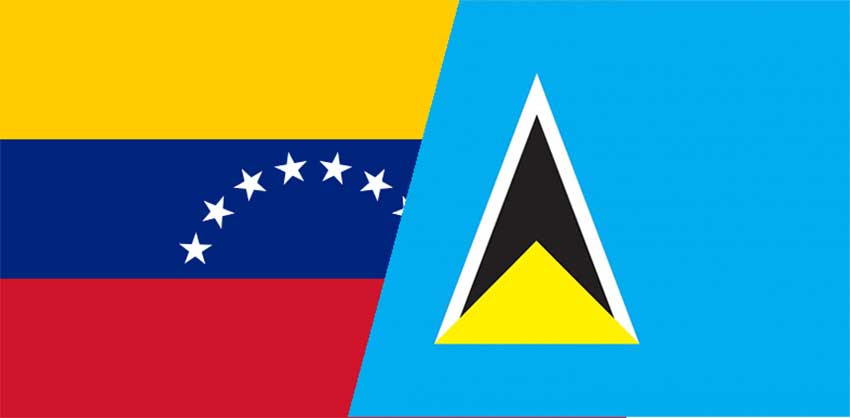
SAINT LUCIA’S handling of its foreign affairs is beginning to trouble me, especially its position on Venezuela.
As a member of the Organization of American States (OAS), Saint Lucia, with 13 other countries of the OAS is part of a group of countries called the Lima Group.
At first impression, the group appears as some international body wielding a lot of power. However, on closer examination, I arrived at the conclusion that the group, which is heavily supported by the USA and Canada (regardless of what Foreign Affairs Minister Sarah Flood-Beaubrun may say) is nothing but a mouthpiece of these two powerful countries and was formed primarily to influence he developments and outcome of the crisis in Venezuela — and nothing more.
The group was established in the Peruvian capital of Lima (hence its name) following a declaration on 8 August 2017. Initially 12 countries (Argentina, Brazil, Canada, Chile, Colombia, Costa Rica, Guatemala, Honduras, Mexico, Panama, Paraguay and Peru) — the majority from Latin America — signed the declaration. Guyana and Saint Lucia joined later.
I read somewhere that the group now demands the release of political prisoners, calls for free elections, offers humanitarian aid, but always criticizes what it claims is the breakdown of democratic order in Venezuela early — just like is also always done by the United States, which is clearly hell-bent on changing the regime in Venezuela. That, to me, is exactly what the Lima Group is all about – nothing less.
I join those who call the Lima Group an ad-hoc group of governments within the OAS with the sole purpose of seeking a regime change in Venezuela.
My Minister of Foreign Affairs has yet to categorically disprove that the election in Venezuela which ushered in Maduro for a second term was fraudulent.
Just saying the election was fraudulent is not proof at all. For instance, can my Foreign Minister tell me how many Venezuelans voted? Was it only Maduro’s party that participated in the election? And if opposition parties participated, how many participated? How many opposition leaders did not participate in the elections and why they did not? Were any of the opposition leaders falsely imprisoned and what were the false charges? And were they imprisoned during the elections? Did Maduro attempt to seek dialogue with opposition leaders? Was Saint Lucia an observer at the elections? What about the polling stations, the polling booths, the ballots — was anything unnerving found there that may have tainted the elections? What really transpired between the Maduro government and the opposition coalition that was to take part in the election? What aspect/s of the electoral process was the opposition coalition upset about?
There are so many more questions that I — and others, I am sure — could put to our Foreign Affairs Minister that are deserving of answers, which, if answered honestly, would give us an insight as to the reasons why Saint Lucia joined the Lima Group. As it stands, by our Foreign Affairs Minister just saying the elections in Venezuela was flawed has put us at a loss in understanding whether the move to join the Lima Group was a good one.
According to a random posting on the internet, “The (Lima) group wants to achieve outside the OAS what it could not achieve within the OAS. Ultimately, it will have to be held accountable as the foreign ideological instigator of any violence that might occur in Venezuela.” I wonder what my Foreign Affairs Minister would say to that…
But that’s not where my troubles end. Saint Lucia, though claiming that Venezuela’s election was fraudulent, seems to have accepted Maduro as president. Now, how could a country which has denounced an election process as a fake and a sham continue to recognize that country? I am not being critical here – and I am certainly not advocating here that we should break ties with Venezuela. Far from that, I am just trying to understand the complexities of international relations, because this certainly is a complex one.
Here is another issue that may or may not be complex but worth mentioning anyway. Out of the blue, the United States pushes 35-year-old Juan Guaidó, a National Assembly leader, into the limelight, saying he is ‘the new president of Venezuela’. Most of the members in the Lima Group have accepted him as such, but – here again — Saint Lucia has not accepted him as the new president of Venezuela. Indeed,
Foreign Affairs Minister Beaubrun this week told reporters that Saint Lucia has not accepted Guaido as Venezuela’s president, stating “We did not pen our name to that statement.”
Beaubrun however said that “Saint Lucia remains in discussions. We have not taken any other position and we will apprise you if anything changes.
“We continue to maintain normal diplomatic relationship with Venezuela, we recognize Venezuela as a friend.
“Our relation has not been strained. We have been very open and frank and whatever decision we took we took in good faith, in friendship — and I’m satisfied.”
Following on all the above, my final questions are: Who determines that an election in a country is either legitimate or illegitimate? Shouldn’t it be the people in the country in which the election took place? Since when can an outside power dictate and decide who should be the real president of another country? And was ‘the new president’ elected to that office by voters in a democratic election?
I’m waiting for the answers!







